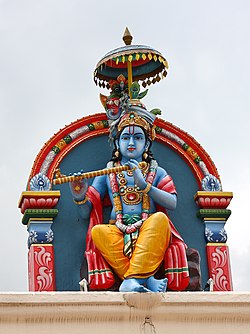Sri Krishna Quote
Related Quotes
It is as difficult for most poor people to truly believe that they could someday escape poverty as it is for most wealthy people to truly believe that their wealth could someday escape them.
Mokokoma Mokhonoana
Tags:
a breeze, a cinch, a piece of cake, a snap, arduous, arduousness, arrogance, arrogant, back breaking, bankrupt
Japanese universities have a chair system that is a fixed hierarchy. This has its merits when trying to work as a laboratory on one theme. But if you want to do original work you must start young, and...
Kenichi Fukui
Tags:
business, chair system, chemistry, difficult, effort, hierarchy, industry, japan, laboratory, merit
About Sri Krishna
Krishna (; Sanskrit: कृष्ण, IAST: Kṛṣṇa [ˈkr̩ʂɳɐ]) is a major deity in Hinduism. He is worshipped as the eighth avatar of Vishnu and also as the Supreme God in his own right. He is the god of protection, compassion, tenderness, and love; and is widely revered among Hindu divinities. Krishna's birthday is celebrated every year by Hindus on Krishna Janmashtami according to the lunisolar Hindu calendar, which falls in late August or early September of the Gregorian calendar.
The anecdotes and narratives of Krishna's life are generally titled as Krishna Līlā. He is a central figure in the Mahabharata, the Bhagavata Purana, the Brahma Vaivarta Purana, and the Bhagavad Gita, and is mentioned in many Hindu philosophical, theological, and mythological texts. They portray him in various perspectives: as a god-child, a prankster, a model lover, a divine hero, and the universal supreme being. His iconography reflects these legends and shows him in different stages of his life, such as an infant eating butter, a young boy playing a flute, a handsome youth with Radha or surrounded by female devotees, or a friendly charioteer giving counsel to Arjuna.
The name and synonyms of Krishna have been traced to 1st millennium BCE literature and cults. In some sub-traditions, like Krishnaism, Krishna is worshipped as the Supreme God and Svayam Bhagavan (God Himself). These sub-traditions arose in the context of the medieval era Bhakti movement. Krishna-related literature has inspired numerous performance arts such as Bharatanatyam, Kathakali, Kuchipudi, Odissi, and Manipuri dance. He is a pan-Hindu god, but is particularly revered in some locations, such as Vrindavan in Uttar Pradesh, Dwarka and Junagadh in Gujarat; the Jagannatha aspect in Odisha, Mayapur in West Bengal; in the form of Vithoba in Pandharpur, Maharashtra, Shrinathji at Nathdwara in Rajasthan, Udupi Krishna in Karnataka, Parthasarathy in Tamil Nadu, Aranmula and Guruvayoorappan (Guruvayoor) in Kerala.
Since the 1960s, the worship of Krishna has also spread to the Western world, largely due to the work of the International Society for Krishna Consciousness (ISKCON).
The anecdotes and narratives of Krishna's life are generally titled as Krishna Līlā. He is a central figure in the Mahabharata, the Bhagavata Purana, the Brahma Vaivarta Purana, and the Bhagavad Gita, and is mentioned in many Hindu philosophical, theological, and mythological texts. They portray him in various perspectives: as a god-child, a prankster, a model lover, a divine hero, and the universal supreme being. His iconography reflects these legends and shows him in different stages of his life, such as an infant eating butter, a young boy playing a flute, a handsome youth with Radha or surrounded by female devotees, or a friendly charioteer giving counsel to Arjuna.
The name and synonyms of Krishna have been traced to 1st millennium BCE literature and cults. In some sub-traditions, like Krishnaism, Krishna is worshipped as the Supreme God and Svayam Bhagavan (God Himself). These sub-traditions arose in the context of the medieval era Bhakti movement. Krishna-related literature has inspired numerous performance arts such as Bharatanatyam, Kathakali, Kuchipudi, Odissi, and Manipuri dance. He is a pan-Hindu god, but is particularly revered in some locations, such as Vrindavan in Uttar Pradesh, Dwarka and Junagadh in Gujarat; the Jagannatha aspect in Odisha, Mayapur in West Bengal; in the form of Vithoba in Pandharpur, Maharashtra, Shrinathji at Nathdwara in Rajasthan, Udupi Krishna in Karnataka, Parthasarathy in Tamil Nadu, Aranmula and Guruvayoorappan (Guruvayoor) in Kerala.
Since the 1960s, the worship of Krishna has also spread to the Western world, largely due to the work of the International Society for Krishna Consciousness (ISKCON).
